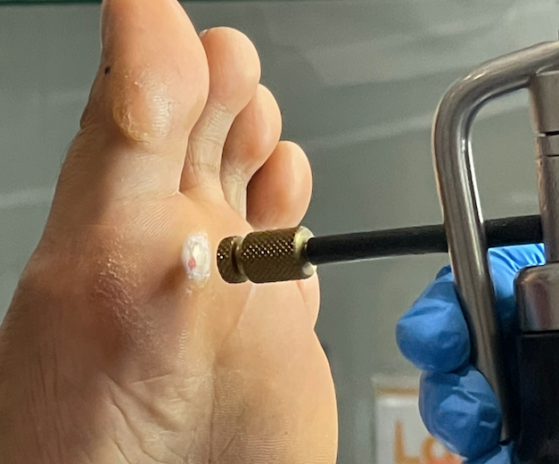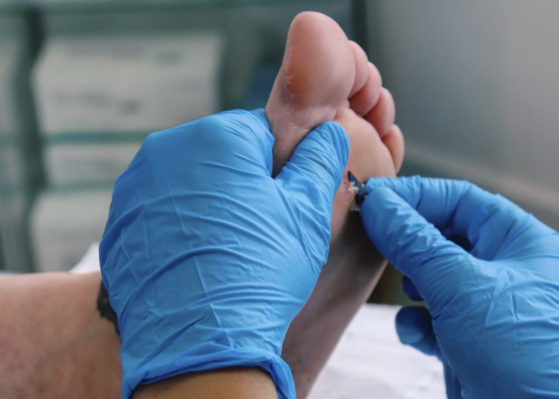
Verruca Specialist
Plantar warts – more commonly known as verrucas – are pressure areas most generally found on the feet. Verrucas are caused by the Human Papilloma Virus (HPV) and they can range from a very small wart of 1mm, to over 1cm in diameter. A verruca specialist will be able to identify a verruca, if you have one, and rule out any other foot condition such as calluses and corns.
Verrucae may be one verruca alone or clustered together. They’re found in both adults and children. If you think your child has a verruca, a children’s podiatrist and verruca specialist can identify these types of warts and offer the best course of verruca treatment.
Why are verrucas painful?
Verrucas can be painful due to the pressure points that they cause on your feet, while also causing annoyance through itchiness.
Due to this discomfort, both children and adults may walk in a way that avoids putting weight on the verruca. If this persists, you can start to suffer with abnormalities in your movement.
If you think you’re experiencing pain in your lower limbs, back or hips because of abnormal movement or a foot issue – our podiatrists can help with a biomechanical assessment.
How long do verrucas last?
Verrucas are a very persistent type of wart. If they don’t go away on their own, they can last for months or even years in some cases.
As verrucas are infectious, and typically spread through foot-to-floor contact, it’s important to get them diagnosed and receive verruca treatment from a professional chiropodist.

How verruca treatment works
There are a number of treatment options for verrucas. At the AGM Centre, the treatment we use depends heavily on:
- The type of wart
- How long it has been on the skin
- The location of the verruca on the skin
- The patient’s age
Verruca treatment affects each patient differently, so it’s not possible to guarantee the outcome. As verrucas are a persistent type of wart, they can also take a long time to disappear after treatment.
Although the results of treatment are never guaranteed, we use a variety of different methods to remove verrucas:
Topical acid applications
Acid is used to exfoliate the skin cells until the wart has been removed. It can also help to trigger an immune response that will build healthy skin cells in the area.
Cryotherapy
Cryotherapy involves removing the wart(s) by freezing the area at very low temperatures. By freezing the skin, ice forms both inside and outside of the cells which disrupt the wart and eventually should remove it. This therapy can cause a small amount of discomfort but the procedure doesn’t take much time.
For larger warts, follow-up sessions of cryotherapy may be needed.
Verruca needling
Verruca needling is an effective way of treating Plantar warts using soft tissue therapy. It’s intended to break down the infected area by creating a controlled inflammatory response. This response triggers the body’s immune systems and will likely kill the virus.
This process typically only requires one or two sessions, and it’s a highly effective treatment used by podiatrists.
As verruca needling is done under local anesthetic, pain is kept to a minimum. After the treatment, most patients report just minor soreness in the area for a couple of days.

Contact us
Verrucas are persistent, and they can interfere with your day-to-day activities. As verruca specialists, we can diagnose verrucas and ensure that we offer you the best course of treatment.
If you or your child are suffering from verrucas, we can help.
Please send a message below and one of our experts will be in touch.
Podiatry Enquire Form


Our Podiatrist will attend to your feet and discuss what further treatment if required